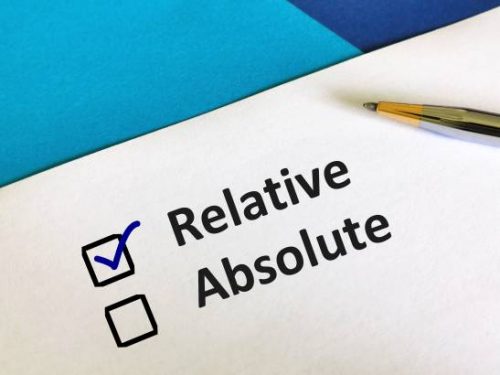Absolute and relative are two words that are often confused because they have similar meanings. The main difference between absolute and relative is that absolute refers to something that is definite and unchanging, while relative refers to something that is changing or relative to something else.
| Absolute | Relative |
| Refers to something that is definite and unchanging. | Refers to something that is changing or relative to something else. |
| Objective. | Subjective. |
| More accurate since it is unchanging. | Often changes because it is a form of comparison. |

Absolute can be used to describe a number, such as “absolute zero,” which is the lowest possible temperature that can be achieved. It can also be used to describe a quality, such as “absolute darkness.”
Relative can be used to describe a relationship, such as “relative age.” It can also be used to describe a comparison, such as “relative size.”
In some cases, absolute and relative can be used interchangeably. For example, if somebody asks you how old you are, you might say “I’m relative to you,” which is the same as saying “I’m relative to your age.”
In most cases though, it is important to understand the difference between absolute and relative, because they have different implications. For example, if you say “the temperature is absolute zero,” you are saying that the temperature is unchanging and definite.
If you say “the temperature is relative to the surroundings,” you are saying that the temperature depends on the surroundings and will change accordingly.
Relative is also often used to mean “subjective,” which means that it is based on personal opinion rather than fact.
For example, if you say “I think the temperature is relative to the surroundings,” you are saying that the temperature is based on your opinion, rather than on a set standard.
In physics, the Kelvin scale is the standard absolute temperature scale, while the Celsius scale is the standard relative temperature scale.
Absolute temperature is measured in Kelvin, while relative temperature is measured in Celsius.
The reason is that Celsius is based on the freezing point of water (0 degrees Celsius) and the boiling point of water (100 degrees Celsius). This makes it easy to compare different temperatures, because they are all relative to water. Kelvin, on the other hand, is based on the absolute zero temperature, which is the lowest possible temperature that can be achieved. This makes it a more accurate measure of temperature.
Other than temperature, other examples of absolute and relative include:
- absolute monarchy – a monarchy in which the ruler has absolute power
- relative age – the age of somebody in comparison to other people
- absolute darkness – darkness that is complete and without any light
- relative size – the size of something in comparison to other things





